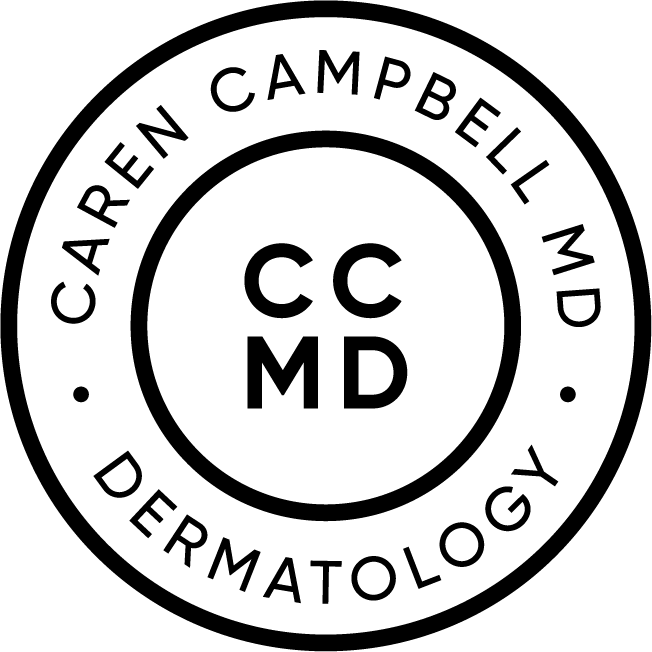Guide to Pregnancy-Safe Skincare: Anti-Aging, Acne and Rosacea Treatments
Pregnancy is a transformative time in life and it often brings changes to the skin, like acne flare-ups, increased sensitivity, and hyperpigmentation. Knowing which skincare products are safe to use can be confusing. At our dermatology practice in San Francisco, led by board-certified dermatologist Dr. Caren Campbell, we provide expert advice on pregnancy-safe skincare for all skincare concerns, including acne, anti-aging, rosacea, and sensitive skin.
Dr. Campbell’s practice focuses on delivering safe and effective dermatological care throughout her patient’s lives including throughout conception, pregnancy, and breastfeeding. Below, we outline evidence-based recommendations for creating a safe skincare routine during these stages.
Safe Skincare During Conception
When preparing for pregnancy, it’s important to consider the ingredients in your skincare products. Some ingredients commonly found in anti-aging or acne treatments can be harmful to a developing fetus, so it’s best to start avoiding them even when trying to conceive.
Ingredients to Avoid During Conception, Pregnancy and Breastfeeding:
Retinoids (Retinol, Tretinoin): Retinoids are commonly used in anti-aging products but should be discontinued during conception. Studies have shown that retinoids are teratogenic and pose a significant risk of birth defects when used during pregnancy, particularly in the first trimester .
Salicylic Acid: High concentrations of salicylic acid, often found in acne treatments, can be harmful during pregnancy. According to LactMed, while small doses in topical applications are generally considered safe, higher doses (such as in peels or leave-on treatments) should be avoided .
Hydroquinone: While hydroquinone can be helpful for hyperpigmentation on the skin, it needs to be avoided during pregnancy.
Benzoyl Peroxide: Best to use an alternative during pregnancy.
Pregnancy Safe Ingredients:
Vitamin C: This antioxidant is safe for use during conception and pregnancy. It helps brighten the skin and reduce hyperpigmentation without posing any risk to the fetus .
Azelaic Acid: This ingredient is safe to use during conception and pregnancy and is effective for treating hyperpigmentation, acne and rosacea .
Safe Skincare During Pregnancy
During pregnancy, hormonal changes can cause various skin issues, such as acne breakouts, melasma (hyperpigmentation), and increased sensitivity. The key is to use products that are both effective and safe for the developing fetus.
Acne During Pregnancy:
Avoid: High doses of benzoyl peroxide and retinoids should be avoided during pregnancy because of potential risks to the fetus .
Safe Alternatives: Look for treatments containing sulfur and clindamycin, both of which are safe for managing acne during pregnancy. Sulfur is particularly effective at reducing inflammation and is well-tolerated even by sensitive skin .Clindamycin is prescription only, but if you are struggling with acne during pregnancy can be helpful.
Additionally, laser genesis and blue light can be helpful for acne during pregnancy.
Anti-Aging Skincare During Pregnancy:
Although many anti-aging treatments rely on retinoids, there are safer options for keeping your skin youthful during pregnancy.
Avoid: Retinoids such as tretinoin or retinol are known teratogens and should be avoided throughout pregnancy .
Safe Alternatives:
Peptides: These help stimulate collagen production without the risks associated with retinoids. Peptides are safe during pregnancy and can reduce the appearance of fine lines .
Hyaluronic Acid: A hydrating ingredient that plumps and moisturizes the skin, hyaluronic acid is safe for use during pregnancy .
Rosacea and Sensitive Skin During Pregnancy:
Pregnancy can exacerbate rosacea and skin sensitivity. Managing these conditions requires gentle, non-irritating products.
Safe Ingredients: Colloidal oatmeal, dimethicone and ceramide contianing lotions are soothing and hydrating ingredients that are safe for use during pregnancy. They help calm irritated skin without causing harm .
Avoid: High concentrations of alpha hydroxy acids (AHAs) can irritate sensitive skin during pregnancy, so it's best to use these sparingly .
Safe Skincare While Breastfeeding
Many of the skincare products that are avoided during pregnancy should also be avoided during breastfeeding, as some ingredients can be passed to the infant through breast milk.
What to Avoid:
Retinoids: These should continue to be avoided during breastfeeding, as they can be absorbed into the bloodstream and transferred through breast milk .
Hydroquinone: This skin-lightening agent used for hyperpigmentation is highly absorbent and should be avoided during breastfeeding .
What Skincare to Use During Pregnancy:
Niacinamide: This anti-inflammatory ingredient is safe for treating mild acne and redness during breastfeeding.
Azelaic Acid: Azelaic acid remains a top choice for managing acne and rosacea postpartum. Studies in JAMA Dermatology confirm its safety and efficacy even while breastfeeding .
Vitamin C: This antioxidant is safe to continue using while breastfeeding and can help brighten the skin and reduce signs of aging .
Peptides: These remain a great anti-aging option postpartum, as they are safe for both mother and baby .
Conclusion
Pregnancy and breastfeeding are transformative times in your life, but they don’t have to come at the cost of your skincare routine. By choosing safe and effective products, you can manage common skin concerns like acne, aging, and rosacea without putting yourself or your baby at risk. If you have specific concerns, consulting with a board-certified dermatologist is always recommended. You can schedule a skincare consultation with Dr. Campbell virtually or in person to discuss skincare that works for your skin.
References:
JAMA Dermatology. (2022). "Safety of Topical Skincare Ingredients During Pregnancy: A Review."
Journal of the American Academy of Dermatology (JAAD). (2019). "Topical Retinoids and Pregnancy: Assessing Teratogenic Risks."
LactMed Database. U.S. National Library of Medicine. Available at: https://toxnet.nlm.nih.gov/newtoxnet/lactmed.htm
JAAD. (2020). "Niacinamide: A Safe Alternative for Pregnancy-Related Skin Concerns."
JAMA Dermatology. (2021). "Azelaic Acid: A Safe Option for Acne and Rosacea During Pregnancy and Lactation."
American Academy of Dermatology. (2023). "Pregnancy-Safe Skincare: Recommendations for Acne and Rosacea."
JAAD. (2018). "Peptides in Dermatology: Assessing Their Role in Anti-Aging Treatments."
National Eczema Association. (2020). "Colloidal Oatmeal: Benefits for Sensitive Skin and Pregnancy."
